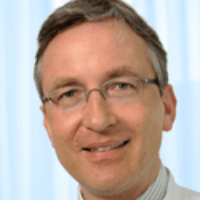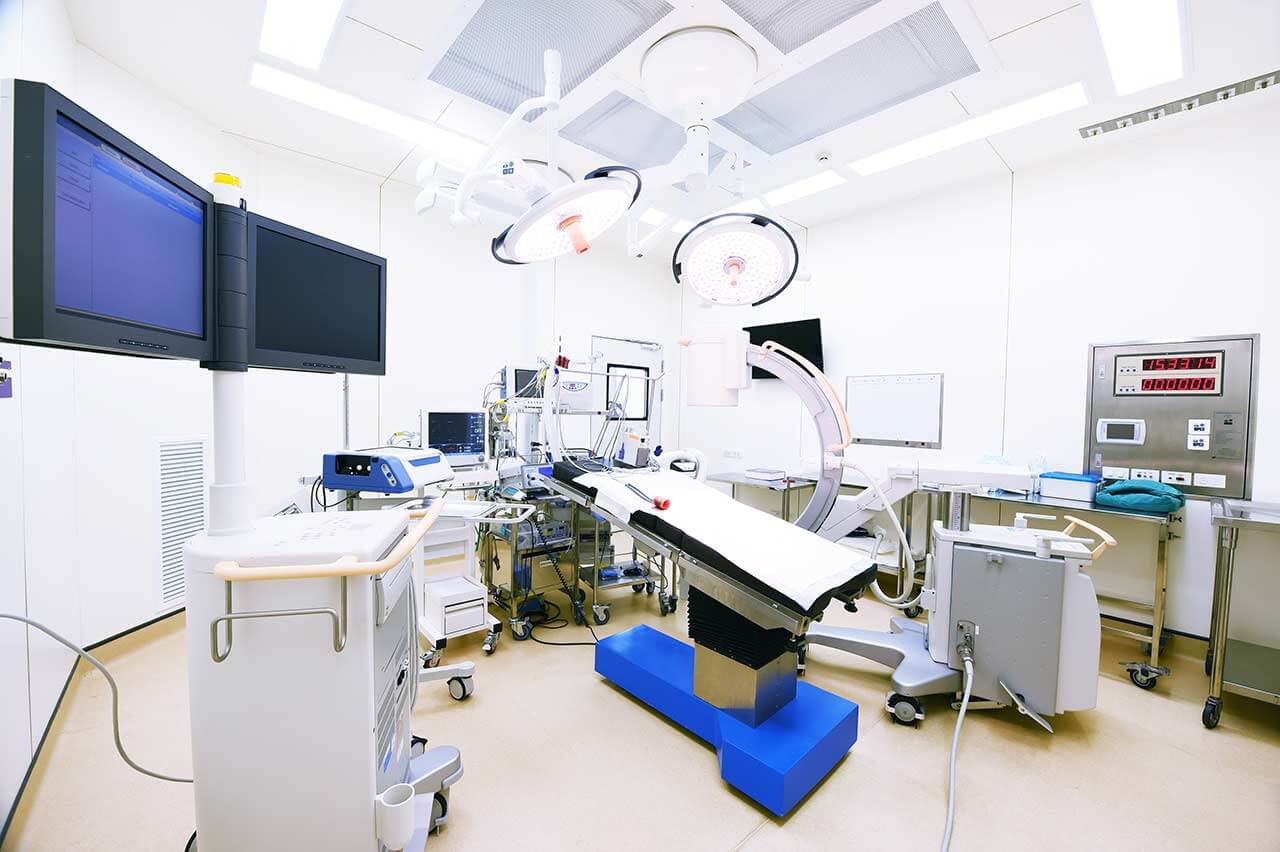
The program includes:
- Initial presentation in the clinic
- clinical history taking
- review of medical records
- physical examination
- laboratory tests:
- complete blood count
- biochemical analysis of blood
- indicators of inflammation
- indicators blood coagulation
- ophthalmologic examination:
- slit-lamp examination
- optical coherence tomography OCT
- pupil function tests
- ocular motility test
- ophthalmoscopy
- perimetry (visual field test)
- computer perimetry
- visometry (without correction and with correction)
- keratometry
- pachymetry
- refractometry (objective, subjective, cycloplegic)
- autorefractometry
- non-contact tonometer
- biomicroscopy
- photokeratoscopy
- preoperative care
- corneal transplantation
- symptomatic treatment
- cost of essential medicines
- nursing services
- elaboration of further recommendations
Required documents
- Medical records
Service
You may also book:
 BookingHealth Price from:
BookingHealth Price from:
About the department
The Department of Adult and Pediatric Ophthalmology at the University Hospital Bonn offers the full range of conservative and surgical treatment of diseases of the eye and its appendages. The department specializes in age-related macular degeneration and other diseases of the retina, corneal diseases, treatment of dry eye and blepharitis, uveitis, refractive surgery using the LASIK technique, etc. During the diagnostics, treatment and all microsurgical interventions the doctors use the very latest medical advances, which meet the highest quality standards. The Chief Physician of the department is Prof. Dr. med. Frank G. Holz.
Key attention is paid to the surgical treatment of various diseases. The department has an excellent reputation in corneal transplantation (keratoplasty), surgical treatment of cataract, glaucoma, strabismus, operations on the eyelids (in developmental defects, the problem of droopy eyelids, tumors), etc. The department also has advanced experience in the treatment of more complex pathologies. These include, for example, macular rotation in age-related macular degeneration, translocation of the retinal pigment epithelium, macular ruptures and edema, vascular eye disease, etc.
In addition, the department is the recognized Laser Surgery Center. Such diseases as retinopathy, retinal breaks, retinal vascular occlusion, secondary cataracts, etc. are successfully treated with the help of modern laser methods. Special attention is paid to the treatment of ophthalmological problems in children and adolescents, for example, laser surgery in the case of retinopathy in newborns. The department offers the very latest treatments, including photodynamic therapy, transpupillary thermotherapy, refractive surgery (LASIK, photorefractive keratectomy), etc.
The therapeutic range of the department includes the following options:
- Anterior segment surgery
- Corneal transplantation (keratoplasty)
- Cataract
- Glaucoma
- Eyelid surgery
- Eyelid malformations
- Ptosis
- Eyelid tumors
- Strabismus surgery
- Vitreous and retinal surgery
- Macular rotation in age-related degeneration
- Retinal pigment epithelium translocation
- Macular tears
- Macular edema
- Epiretinal gliosis
- Retinal detachment
- Vascular diseases
- Removal of the vitreous body (vitrectomy)
- Laser surgery
- Diabetic retinopathy
- Retinal breaks
- Retinal vascular occlusion
- Secondary cataract
- Glaucoma
- Retinopathy of prematurity
- Photodynamic therapy (PDT)
- Transpupillary thermotherapy
- Refractive surgery (LASIK, PRK)
- Conservative treatment
- Botulinum toxin injections
- Dry eye syndrome (Sicca syndrome)
- Glaucoma
- Inflammation of the inner part of the eye (uveitis)
- Lysis therapy in vascular occlusion
- Age-related macular degeneration
- Prosthetics
- Institute of Ophthalmic Prosthetics
- And other options of conservative and surgical treatment
Curriculum vitae
Education and Professional Experience
- 4/1983 - 5/1989 Study of Medicine, University of Heidelberg, Germany.
- 1986 - 1987 Medical thesis in Physiology: "Renovascular effects of adenosine receptor agonists" (magna cum laude), doctoral degree (Dr.med.).
- 9/1987 Clinical Clerkship in Hematology / Bone Marrow Transplantation, Johns Hopkins University in Baltimore.
- 4/1988 - 11/1988 Clinical Clerkship in Surgery and Internal Medicine, Pritzker School of Medicine, University of Chicago, Chicago, USA.
- 1989 - 1991, 1994 Residency, Department of Ophthalmology, University of Heidelberg, Germany.
- 1992 - 1993 Research and Clinical Fellowship, Institute of Ophthalmology, Moorfields Eye Hospital, London, England.
- 9/1993 Research Project, Schepens Eye Research Institute, Boston, USA.
- 1994 Board certification in Ophthalmology.
- 1995 - 2003 Senior Physician in the Department of Ophthalmology, University of Heidelberg, Germany; 2001 - 2003 Head of the Department.
- 10/1997 Habilitation (Associate Professor) in Ophthalmology: "Age-dependent changes in Bruch’s membrane and retinal pigment epithelium as pathogenetic factors in age-related macular degeneration".
- Since 2003, Chief Physician of the Department of Adult and Pediatric Ophthalmology, Chairman and Professor, Department of Ophthalmology, University of Bonn.
Scholarships and Awards
- 1987 - 1989 Fellow of the German Academic Scholarship Foundation ("Studienstiftung des Deutschen Volkes").
- 1988 Scholarship of the German Academic Exchange Service (DAAD).
- 1992 - 1993 Research Scholarship of the Gertrud Kusen Foundation, Hamburg, Germany.
- 1999 Macular Degeneration Research Award for the Prevention of Blindness. Pro Retina Germany and Switzerland.
- 1999 Research Award of the German Ophthalmological Society (DOG).
- 2000 Achievement Award of the American Academy of Ophthalmology (AAO).
- 2001 Leonhard Klein Award for Ophthalmic Surgery.
- 2005 DOC Award, German Ophthalmic Surgeons.
Membership in Professional Societies
- American Academy of Ophthalmology (AAO).
- Association for Research in Vision and Ophthalmology (ARVO).
- Macula Society.
- Club Jules Gonin.
- Oxford Ophthalmological Congress (OOC).
- European Fluorescein Angiography Club (FAN-Club).
- Euretina.
- German Ophthalmological Society (DOG).
- German Retinological Society.
Photo of the doctor: (c) Universitätsklinikum Bonn
About hospital
According to the authoritative Focus magazine, the University Hospital Bonn ranks among the top ten medical facilities in Germany!
The hospital was opened on January 1, 2001, although in fact it inherits the medical facility, which operated at the Faculty of Medicine of the University of Bonn. The hospital in Germany combines all the highest standards of modern university medicine of the international level. A highly competent team of experienced physicians, which consists of more than 8,000 employees from various fields, takes care of the patients’ health.
The hospital has 32 specialized departments and 23 institutes, which implement the highest standards of treatment in Germany. On their basis, in addition to the successful clinical activities, the productive research and training of young specialists are carried out. Also, the hospital has 10 intensive care units and more than 30 cutting-edge operating rooms. They are equipped with the advanced surgical, navigation and monitoring systems, which provide sparing and the most effective surgical treatment. The total number of places for hospitalization is 1,250 beds.
The hospital presents all fields of medicine, while many of them are awarded by prestigious German and international certificates. For example, in 2007, the Comprehensive Cancer Center of the hospital became one of the four winners at the nationwide competition among Cancer Centers of Excellence. The research focuses primarily on the clinical genetics and genetic epidemiology, neurology, immunology and infectiology, hepatology and gastroenterology, and diseases of the cardiovascular system. The research findings contribute to the development of new therapeutic methods and overall improvement of treatment in Germany.
The main value for all employees of the hospital in Germany is human health, his individual needs and wishes, therefore, despite the high-tech infrastructure, the focus remains on the human attitude and respect for each patient.
Photo: (с) depositphotos
Accommodation in hospital
Patients rooms
The patients of the University Hospital Bonn live in cozy single, double and triple rooms, designed in bright colors. The standard room furnishing includes a comfortable bed with a remote control, a bedside table, a wardrobe, a table and chairs, as well as a TV and a telephone. Each patient room is equipped with an ensuite bathroom with toilet and shower. The hospital also provides enhanced-comfort rooms.
Meals and Menus
The patients of the hospital are offered tasty and balanced three meals a day: breakfast, lunch and dinner. Every day each meal features three different menus, including a vegetarian one. If you for some reason do not eat all the food, you will be offered an individual menu. Please inform the medical staff about your dietary preferences prior to the treatment.
Further details
Standard rooms include:
Religion
Christian priests are available for the patients at any time. Representatives of other religions may be requested at any time.
Accompanying person
Your companion may stay with you in your room or at a hotel of your choice during the fixed program.
Hotel
You may stay at the hotel during the outpatient program. Our employees will support you for selecting the best option.
The hospital offers a full range of laboratory tests (general, hormonal, tests for infections, antibodies, tumor markers, etc.), genetic tests, various modifications of ultrasound scans, CT scans, MRI and PET / CT, angiography, myelography, biopsy and other examinations. Treatment with medications, endoscopic and robotic operations, stereotaxic interventions is carried out here, modern types of radiation therapy are also used. The hospital offers patients all the necessary therapeutic techniques.
- Surgical treatment of the brain tumors, tumors of spinal cord and spine
- Replacement of all joints, resection arthroplasty
- Deep brain stimulation and vagus nerve stimulation in patients with epilepsy
- Multimodal complex treatment of Parkinson disease
- Thoracic endovascular aortic repair (TEVAR)
These are benign and malignant breast pathologies, malignant tumors of various localizations, neuromuscular diseases, stroke, retinal pathologies and various visual impairments, infertility, autoimmune diseases, epilepsy, coronary artery disease and myocardial infarction, leukemia and other pathologies.
- Ophthalmology
- Epileptology
- Reproductive medicine
- Hematology and oncology
- Neurosurgery
Over 8,000 highly qualified doctors and other employees work at the hospital.





